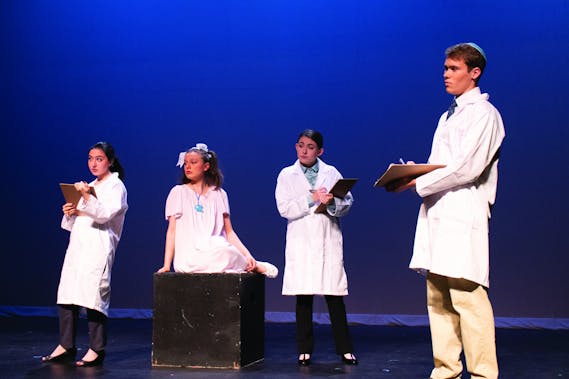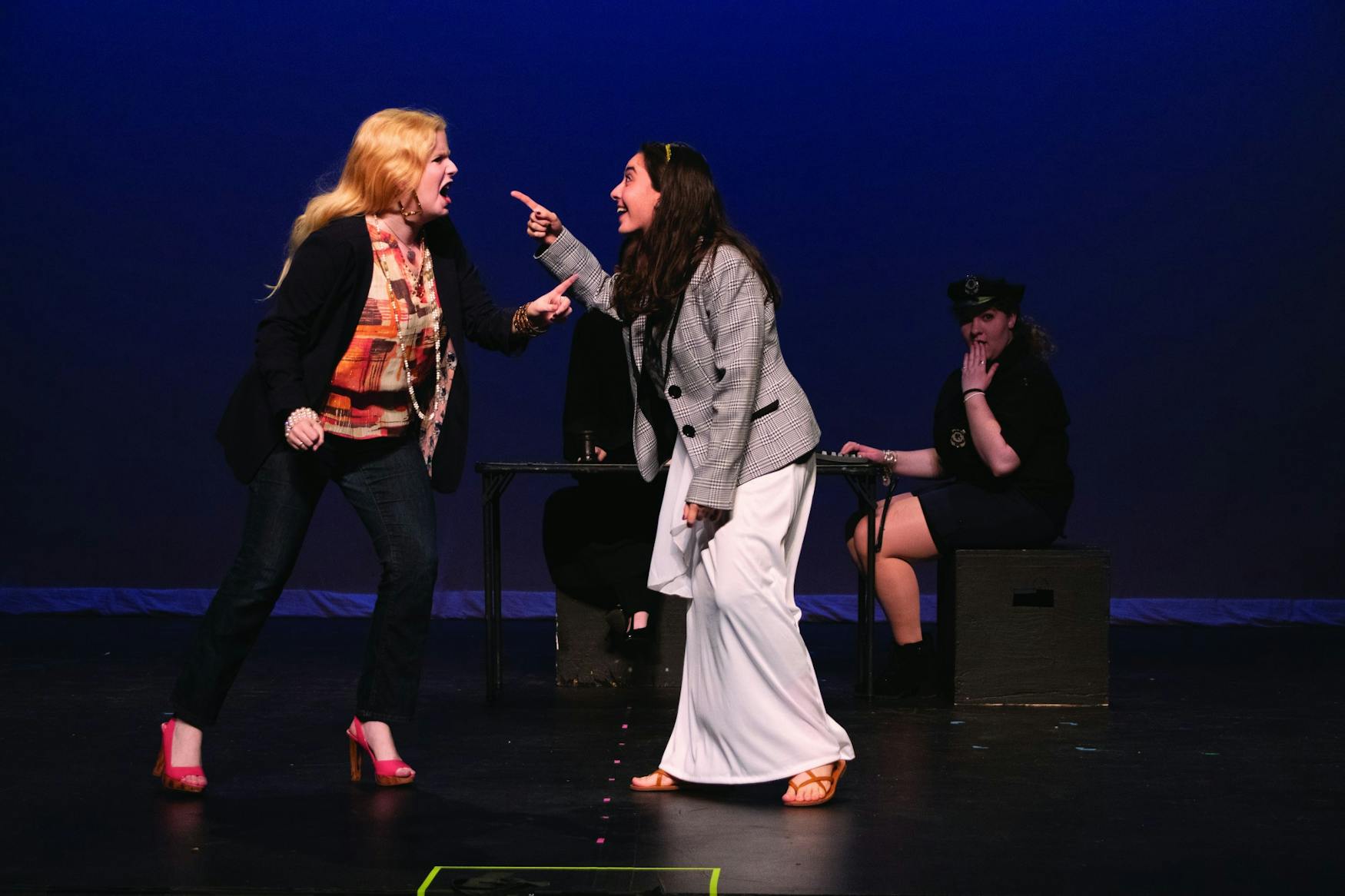‘Oy!’ will make your zayde laugh
I wasn’t sure what to expect going into “Oy!” on its Nov. 7 opening night. I was certainly not expecting the first thing I saw to be a bunch of boss-ladies (and Lucian Dobroszycki ’23) in utterly fabulous pantsuits, but that’s what I got, and I am not complaining. I would like to dedicate this entire opening paragraph to costume designer Kat Lawrence ’21 for the many superb pantsuits and blazers in this show, as well as the heels that Shoshi Finkel ’20 wore in the scene, “Can This Marriage Be Saved.”
Technically speaking, this was a strong show. Two of the 12 self-contained scenes stood out for me in terms of direction: “Oy!” (for which the show is named) and “Murray, Leo and Sol Rewrite the Criminal Code.” Both scenes feature the same trio of crotchety old Jewish men (Evan Shapiro ’22, Dobroszycki and Harrison Carter ’22) sitting together in the shvitz, and both were audience favorites. Although I personally found the “Oy!” scene more annoying than comedic, the rest of the audience loved both scenes, and I was impressed with director Becca Lozinsky ’20’s ability to make an entertaining performance out of an otherwise visually uninteresting situation. I will also say that Carter is a stellar crotchety old Jewish man.
Several parts of “Oy!” took concepts that were close to home for me — and for many members of the Jewish community — and opened them up for examination. Sure, there were quite a number of loud, whiny Jewish mothers on stage, but there was also the tense and undefined father-son relationship explored in “Close Call,” the complications of being gay, Jewish and dating a shiksa outlined in “Come Light the Menorah” and several others. Was each sensitive topic handled well by the script? Perhaps not. But perhaps they were in the time they were written. I genuinely am not sure, and I don’t really think it matters. They made me think a little more deeply and critically about the people in my community, and they made the audience laugh. Isn’t that all you can really ask of a student-produced comedy?
The Judaism described in many of the scenes reminds me of the Judaism my parents grew up with in the 1950s and 1960s. For those who are not familiar, think along the lines of the Amazon hit, “The Marvelous Mrs. Maisel” — a little too reliant on sexist and anti-Semitic stereotypes, but ultimately sweet and certainly reflective of its time. While “The Marvelous Mrs. Maisel” was set in the 1950s and produced in 2018, most of the scenes in “Oy!” were written in the 1990s. You know what else was written in the 1990s? “Friends.” I’d say “Oy!” has aged better than “Friends,” and we will leave it at that. Basically, if you’re morally opposed to cringeworthy Jewish mother stereotyping and overly nebbish young men, this may not be the show for you.

PUTTING IN WORK BEHIND THE SCENE: The costumes were all simple but effective, and the designers deserve to be praised for the work they put in.
Now that the grievances have been aired, I want to focus on the really wonderful aspects of this show. I cannot name every cast member or even every director, because there were simply so many, but the comedic timing in the show overall was excellent, especially considering it was the opening night. I will highlight just a few extraordinary performances:
Esther Shimkin ’21 is always a delight to watch onstage, but her performance as Stevie Goldstein in “Stevie Goldman Faces the Day of Atonement Unprepared” was an absolute riot. I laughed out loud.
Leanna Ugent ’22 is also an Undergraduate Theater Collective regular and a crowd-pleaser. Like the rest of the cast, she played multiple roles throughout the show, and I most enjoyed her as Protagonist in “Last Minute Adjustments.” As a child about to be born receiving her soul, Ugent kicked and screamed, not wanting to enter the complicated and painful world we inhabit — a scene that made me laugh and made me think, “perhaps I would be better off as an aardvark.”
Shoshi Finkel has returned to the UTC after a couple of years off, and her performances were strong throughout. Her strongest scene, however, was “Can This Marriage Be Saved?” in which she (wearing what appeared to be 6-inch heels) represented the entire human race in court, trying to divorce God (Ruthi Wasserman ’23). I can’t describe Finkel’s performance better than the girl sitting next to me in the audience, who leaned over and whispered, “Wow, Shoshi is so good.” She was just so good.
Finally, Evelyn Inker’s ’23 portrayal of Russian yenta Rhoda Wikoff in “A Trolley Named Tsuris” (a parody of “A Streetcar Named Desire”) was authentic and hilarious. I cannot wait to see what Inker’s future involvement in theater at Brandeis will look like.
The show wasn’t perfect, but it was good. If it were running for longer than a weekend, I’d recommend that you see it if you haven’t already. Given that it isn’t, I’ll leave you with a quote from everyone’s Russian bubbe, Rhoda Wikoff: “People will always respect you if your SHOES and your HANDBAG match!!”
Glossary:
Bubbe — N. Grandmother
Nebbish — Adj. Pitiful, geeky
Shiksa — N. Gentile woman (derogatory)
Shvitz — N. Sauna
Yenta — N. A gossipy or nosy woman
Zayde — N. Grandfather



Please note All comments are eligible for publication in The Justice.